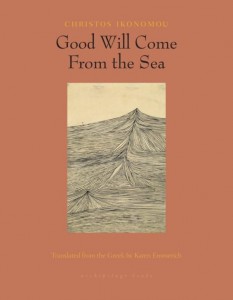Curious about new titles in translation from around the world? We’ve got you covered here, in this edition of What’s New in Translation.

Woman of the Ashes by Mia Couto, translated from the Portuguese by David Brookshaw, World Editions, 2019
Review by Lindsay Semel, Assistant Editor
Mia Couto’s Woman of the Ashes, translated from the Portuguese by David Brookshaw, is the first book of a trilogy called As Areias do Imperador (The Sands of the Emperor). It tells of the fall of the Gaza Empire in Mozambique at the hands of the Portuguese. Brookshaw’s translation successfully elaborates on the original’s rich images and themes while maintaining the ambiguity and contradiction that characterize the disordered world of war between cultures. Through its two narrators, the novel weaves together the threads of two archetypal narratives. The warp is a story of empire and war. The weft is a story of storytelling itself.
The year is 1894–5, the confused and bloody moment in which the Portuguese Empire replaces the Nguni as the leading force in a region full of once independent peoples. Alternating chapters consist of a series of letters from the Portuguese Sergeant Germano de Melo, ostensibly to his supervisor. The voice of the interceding chapters belongs to Imani, a girl from a tribe that’s tentatively aligned itself with the Portuguese in the hopes of resisting the Nguni invaders. Having learned fluent Portuguese, she is appointed by her father to attend Sergeant Germano, himself a convict exiled for the crime of political action against the monarchy. These complementary characters find themselves dislocated from their people and sense of identity, stuck serving the very forces that sentence them to their own demise.
Though Imani and Germano speak for those sacrificed to the voracity of the Portuguese and Nguni Empires, their representation is really much more expansive. “Wars never begin,” cautions Imani’s pacifist father. “When we awaken to them, we realize they started long ago.” The petty gamble of allying oneself with a given power becomes absurd in the universal perspective of the novel. The story of the particular battles loses itself in the stories of the victors and the defeated, what rises to the forefront is exactly they gain and lose—what gives value to the experience of living.
This move, attaching the specific to the eternally repeated and mythological, is a defining characteristic of the novel. But we find it particularly effective and pervasive in the presentation of the act of storytelling itself. The tracts of Imani and Germano both leave ambiguous the questions of reader and purpose until we’re told of a fable about:
“a man who had done nothing except write ever since he was a child All his infinite scribbling was, in the end, no more than one sole tract: it was a letter to the Messiah. In this missive, the man enunciated the world’s evils . . . There came a day when the man no longer knew where the door and windows were. His was now but an inner world. At this time, he decided he should end his long epistle. He signed his name at the end of the last paragraph and lay down with the sheet of paper on his chest. It was then that he realized his infinite letter had been addressed to himself. He was the Messiah. And he was dead.”
This anecdote brings into focus the ‘to whom’ and the ‘why’ of Imani and Germano’s narratives. With so little else to usefully define their identities, they become aligned with this nameless bard, testifying to an awaited Messiah who, through writing, he discovers to be himself. The fate of the helpless scribe/messiah can be none other than the fate of us all: to die and rejoin the elements of earth, air, water, and ash, elements that stage in turn that same enunciated evil.

Love in No Man’s Land by Duo Ji Zhuo Ga, translated from the Mandarin and Tibetan by Hallie Treadway, Head of Zeus, 2019
Review by Andreea Scridon, Assistant Editor
Duo Ji Zhuo Ga’s Love in No Man’s Land traces the consequences of the dramatic ruptures in the life of a young boy, Gongzha, growing up in The Changtang Plateau. Coming of age at the time of the Cultural Revolution, Gongzha is complicit in hiding treasures of the local Tibetan temples, and suffers a major trauma when the object of his love, Cuomo, is mauled to death by a bear. Both events are to have resounding effects on his life, as well as those of the subsequently appearing characters linked to him, in alternation between revenge and redemption.
If embarking on the commitment of reading a 480-page epic, it’s wisest to be clear about what you seek to gain from such a novel. In the most schematic of dichotomies, people are either thinkers or doers. I use this framework to conclude that the reader who would enjoy Love in No Man’s Land belong to the doer category, as the book excels in pacing and narrative action. There is great emphasis on action and plot advancement, particularly in the realm of interpersonal relationships.
As a thinker, I found myself in a position of fatal incompatibility, unable to cut my losses with what I perceived were the book’s shortcomings, the worst of which were linguistic. Stronger choices on the nanoscopic level of similes and even verbs would have improved a piece of such density. The book is replete with phrases like “out there on the grassland, dog and woman made a perfect picture” that strike the reader as linguistically lazy, or even “but freed of her cumbersome underwear, she could feel every hair on her body dancing with pleasure in the warm water”, which reads like cheesy porn. Overall, the prose is symptomatic of the trouble with the romance genre, which nearly always seeks to outdo itself by presenting love as grand and all encompassing, yet paradoxically achieves the opposite as a result of excessive zeal. The prose is married to this genre in a bizarre and volatile manner, occasionally plunging into quasi-naturalistic gore: “Sega glared at the tottering Feng, her mind seething with hatred. She rushed over with her knife and savagely stabbed Feng in the chest. Fresh blood spurted, splattering Sega’s face and body.”
I was disappointed by the superficiality in characterization: every positive female character is beautiful, while every female antagonist tends towards “wrinkled”. The crux of the plot, meaning Gongzha’s fixation with his dead first love, is resolved by another “celestial maiden” ending up on the pedestal of love intended for her predecessor. Though many women in the book are willing to humiliate themselves in this manner, it never becomes clear exactly what it is that makes this man so magnetic.
The most interesting aspect of the book is its somewhat anthropological nature. Although the game of love is universal, it becomes more absolute in the dire and cruel conditions of the mountain Grasslands. In this sense, the excessively straightforward style is useful in considering a particular sensibility: could it be that the semantic pragmatism is reflective of a society that must adapt to be that way? That this style is implicitly a justification of a value system? Yet the discrepancy between puerile and even maudlin moments and downright grotesque descriptions is jarring.
There are moments of grace: “far out on the water, a thin layer of mist was rising; under the moonbeams, it seemed like a young woman’s feelings—sometimes visible and sometimes not.” I cannot accuse the author of being negligent with either detail or deliberation: there are occasionally likable characters, like the protagonist’s father, Lunzhu, and the prose at least feels purposeful and earnest. Yet the spiraling-off of the narrative, in which many characters seem to play Ping-Pong around the same hexagon or pentagon of unrequited love renders the story equally centrifugal and repetitive. This, paired with abrupt temporal shifts, makes for a synchronic disconnection in plausibility, and the result is somewhat flat: “No one understood Gongzha. Of course, Gongzha did not need anyone to understand him. He was only true to his own heart.” This book is full of such matter-of-fact statements, which instill a sense that reading the book is something of a marathon.
Unfortunately, the novel does not excel in sophistication on either a formal or on a psychological level. Perhaps it would save face as a screenplay: there is cinematographic potential, but it spreads the butter too thin to have any lasting impact on the reader.

Good Will Come From The Sea by Christos Ikonomou, translated from the Greek by Karen Emmerich, Archipelago, 2019
Review by Jacob Silkstone, Assistant Managing Editor
Near the height of the Greek debt crisis, Slavoj Žižek sketched a grim portrait of the country for the LRB:
“Imagine a scene from a dystopian movie that depicts our society in the near future. Uniformed guards patrol half-empty downtown streets at night, on the prowl for immigrants, criminals and vagrants. Those they find are brutalised. What seems like a fanciful Hollywood image is a reality in today’s Greece.”
Of all contemporary Greek writers, Christos Ikonomou is among the closest to the heart of his devastated nation, a nation described by an assortment of characters in Good Will Come From The Sea as “in the gutter. . . ruined . . . this whore of a country.”
Even writing from a country in the gutter, Ikonomou’s latest collection is still able to steal the occasional glance at the stars. An unnamed character (“I don’t remember who it was—we were all plastered, twelve sheets to the wind”), tells his friends that “I feel this country beating like a heart inside me. It’s like having two hearts.” Similar moments of lyricism are allowed to break into a collection of predominantly bleak tales, although Ikonomou has a habit of making his characters apologise for anything overly poetic or aphoristic by blaming their temporary flights of the imagination on alcohol.
Good Will Come From The Sea is the second of Ikonomou’s collections to be translated into English (following Something Will Happen, You’ll See), and consists of four extended stories, each occupying that uncertain hinterland between short story and novella. All four stories are set on the same nameless island in the South Aegean —an island assailed, as a sequence of brief italicised interludes makes clear, by earthquakes and tsunamis.
The title recurs in all four stories, and is introduced by Tasos, a hopeless dreamer, a “poor bastard… a naïve piece of work.” The narrator and his friends adopt the phrase from Tasos and “Whenever anything goes wrong, whenever any of us gets bad news – be patient, we say, good will come from the sea. Good will come from the sea. It’s something we foreigners say, a kind of password just for us.” Tasos exits the story by running into a cave, his final words an inarticulate howl of rage “that none of us heard.” As the other characters search for Tasos, his ex-partner Magda curls up in a corner and repeats “Good will come from the sea . . . over and over, like a song. Or a dirge.”
Ikonomou’s Good Will Come From The Sea is a combination of song and dirge, both lyrical and despairing. References to fairy tales are another recurring feature of the collection: “If it were a fairy tale, if all this were a fairy tale, if only it were a fairy tale. Because fairy tales have happy endings,” repeats one of the characters, Lazaros, on a futile search for his missing son. “People need a good fairy tale every now and then,” says the narrator of the first story. “People invented fairy tales and filled them with monsters so they wouldn’t become monsters themselves.”
Good Will Come From The Sea is not a fairy tale, of course. It offers very few happy endings. What it does offer, though, is faith in the power of stories to bear witness, and even to bring communities together. “In order for us to rebuild this country all over again from scratch,” muses Tasos semi-drunkenly, “we first have to rebuild ourselves from scratch.” Ikonomou’s collection is perhaps an integral part of that rebuilding process.
*****
Read more reviews from the Asymptote blog:

